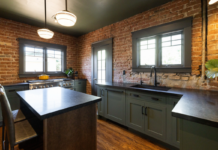[ad_1]

When it comes to being the most important part of a kitchen, the kitchen sink can be overlooked. The range, refrigerator provide essential functions and take up a lot of space, and cabinets, countertops and kitchen islands are most essential with the storage and preparation roles of a kitchen. However, when you realize how important water is to the cooking process, how much of a beating a sink must sustain and what you immediately see when you walk into a kitchen, the kitchen sink ends up being the equipment that ties a kitchen together. Whether you’re looking into building your own home, remodeling or fixing a broken sink, knowing what the best kitchen sink material is and the types of kitchen sinks materials that make for a quality sink is essential to getting the sink that will make your kitchen spectacular.
Below, we review some of the different kitchen sink materials and their respective benefits and possible problems.
Image: devol kitchens
Kitchen Sink Materials Pros and Cons
1. Stainless Steel Kitchen Sink
Pros: A stainless sink is considered to be a great value sink based on its cost and longevity, as a quality sink can last indefinitely. Stainless steel is durable, with the stainless coating preventing any rust formation. Stainless steel also happens to be very sanitary as bacteria cannot stick to its surface. They also offer a relative degree of versatility. They match stainless steel sink fixtures and appliances and can blend with other materials.
Cons: Stainless steel sinks are relative uniform regarding shape and composition, as they cannot be combined with other materials, which may limit your design preferences. Also, given the composition of stainless steel, they can be rather loud when other materials come in contact with them and can potentially scratch from contact with dropped materials or from abrasive cleaning supplies.

2. Granite Composite Kitchen Sink
Pros: Given the combination of granite with acrylic resin, granite composite sinks are known to be exceptionally durable. They are also non-porous, which makes them easy to clean and won’t require chemical cleaners. Also they are generally chip and scratch resistant. The combination of the uniqueness of natural stone with a synthetic filler helps to create a unique finish for each sink.
Cons: Granite composite sinks can be somewhat expensive compared to ceramic and stainless steel sinks. Further, stone is a heavier material and the sink may require bracing or professional installation. Given the limitations of manufacturing, only a matte finishes are available, which may not be sufficient variety for your design scheme.

3. Cast Iron Kitchen Sink
Pros: Cast iron sinks can be installed in a variety of manners, including undermount, drop-in and apron style and can come in a variety of colors. Cast iron is a very durable material, which means that your sink will not dent or crack easily.
Cons: Cast iron is a very heavy material and, like granite composite sinks, will most likely need additional support relative to your countertop and bottom cabinets. Since cast iron requires an enamel coating to prevent rusting, with the enamel being less rigid, the enamel can potentially chip if hit. Also, enamel is more susceptible to staining than other sink materials.

4. Fireclay Kitchen Sink
Pros: Fireclay is made of clay and glaze fired at high temperatures. Given the nature of ceramics, it is resistant to acids and bases, a good combination given usual sink exposure. It is non-porous, which makes it easy to clean. It is a very durable material that is relatively chip resistant and doesn’t scratch.
Cons: Fireclay is not one of the more common kitchen sink materials, which makes it has a limited amount of sizes and colors and can be a bit more expensive. Likewise, its exceptional rigidity can be a problem if a fragile material is dropped, as it will most likely crack against the unforgiving fireclay. Like other more dense materials, it will require added structural support.
Image: Laura & Nora

5. Enamel Kitchen Sink
Pros: Enamel, or porcelain, kitchen sinks are very popular for their durability and ease of care. Likewise, porcelain comes in a variety of colors that can be tailored to your design preferences, unlike more uniform styles such as stainless steel.
Cons: Enamel sinks can chip easily, so one must take care when handling larger objects in the sink area. Also, enamel is more susceptible to staining, especially for lighter colors. Enamel sinks are on the heavier end of the sink material spectrum, so like other heavy materials, they will require more support during the installation.
6. Stone Kitchen Sink
Pros: Natural stone sinks, made from materials such as marble, limestone or granite, are considered an exceptional material as they are exceptionally durable and resistant to rust, humidity and chemicals while being easy to maintain once sealed. They are also rather versatile as they can be used for small or larger sink applications. Many desire stone sinks because of the unique patterns in the respective stone that make each sink unique.
Cons: Like other sink materials, stone sinks can be very heavy. Because of the nature of stone sink fabrication, they can also be somewhat expensive. They require a bit more maintenance to maintain the sink, with regular sealing to seal the naturally occurring pores in the stone, and they are also susceptible to discoloration due to oxidation, though this can be prevented with mineral oil applications.

7. Quartz Kitchen Sink
Pros: Quartz is similar to stone, making it another exceptionally durable material that is resistant to chips, cracks and stains. It is also a very smooth material and non-porous which makes it very hygienic and easy to clean. It can be manipulated into different forms more easily than stone, comes in a greater variety of colors and is less expensive relative to its composition.
Cons: Like other durable kitchen sink materials, quartz can be a problem if a breakable dish is dropped into the sink. Quartz is not completely customizable, meaning that certain colors or shapes may not be accommodated, and darker colors, ironically, show more wear in the material over time.

8. Copper Kitchen Sink
Pros: For a unique kitchen sink material, copper offers many benefits. First, copper is a naturally resistant to rust, corrosion and bacteria, helping to keep your kitchen sanitary. Copper is a very durable material and can be made from recycled copper, making it a good choice for environmentally conscious homeowners. Copper can be shaped into a variety of styles and develops a patina over time, helping to make your sink one of a kind.
Cons: A copper sink will require slightly more maintenance, as copper is naturally prone to acids and harsh cleaners and some copper coatings can potentially be dented or scratched easily. Given the relative degree of maintenance, manufacturing and installation, it is more expensive than other materials.
9. Acrylic Kitchen Sink
Pros: Acrylic shapes can be molded into a variety of shapes, making it a very versatile material. Also, because of its uniform composition, small scratches can be buffed out or filled in with a similar acrylic compound. It is very noise resistant and more forgiving to dropped dishes. They are very lightweight, making installation much easier than other sink materials.
Cons: Although durable, it is not as durable as other sink materials such as stainless steel or cast iron. Acrylic is also not resistant to petroleum-based products, so care must be taken during cleaning. Acrylic scratches easily, so abrasive materials should be used with caution, and hot materials can potentially burn or stain the material.
Conclusion
As you can see, there are a variety of kitchen sink materials. While determining the best kitchen sinks materials may be a bit of a challenge, knowing what your options are can help you make the right choice based on your kitchen specifications. If you want to make sure that you have the best kitchen possible, then it helps to know what the best kitchen sink material is for you.
The post Kitchen Sink Materials Pros and Cons appeared first on Decoholic.
[ad_2]
decoholic.org
















